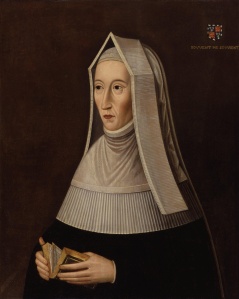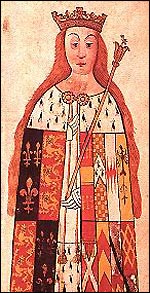It’s over, and I have reserved judgement until now. Fear not, plot revelations will be kept to a minimum for the benefit of those yet to watch it, and my observations will focus on the White Queen as an historical piece, an adaptation and a drama.

Historically, as might be expected, the drama was rife with errors, many of which have been well-publicised in the other reviews I have read. The settings and costumes were somewhat anachronistic, the sequence of events or locations altered and key individuals omitted (where was William Hastings?).

Additionally, of course, it played on the mystery surrounding the disappearance of the Princes in the Tower, seeking to exonerate Richard III, with whom the blame for the presumed murder of the two boys traditionally rests. This will no doubt please Ricardians, but in apportioning the blame to (an)other individual(s), the Ricardian/Gregory camp are reminiscent of the Tudor/Shakespeare propagandists of the Early Modern era, albeit placing their conclusions on the basis of more (objective) evidence than the latter had to hand, though without the advantages of proximity to the events that the former could claim.

Despite these ‘flaws’, I am praiseworthy of the lengthy portrayal of an era of English history that has been hitherto neglected both in drama and documentary, which will no doubt lead to renewed interest in the Wars of the Roses.
Furthermore, it must be remembered that this was not intended as an accurate historical portrayal; it was an adaption of the Cousins’ War novels by Philippa Gregory. Having read The White Queen, The Red Queen and The Kingmaker’s Daughter, I faced the usual issues with the characters and events in the dramatization not conforming to my ideals, which is to be expected with any adaptation from book to screen, and hardly a fault of the production, and it was comforting to read that Gregory herself was satisfied with both.

Notwithstanding this, I am grateful to Gregory for bringing to life these three intriguing women and their contemporaries, and through her books and this adaptation, allowing those whose knowledge was limited to snippets about the Wars of the Roses, Richard III and the Princes in the Tower to fill in the gaps, and thus providing me with an opportunity to discuss these events and individuals (by invitation no less!) with my family members round the dinner table. Indeed, the majority of the historical errors referred to above were the fault of the dramatic licence of the script writers, not specifically Gregory (as her work attests).

Finally, with regard the drama itself, there are, once again, positives and negatives, beyond those already touched upon above. Yes, it may have lacked the pace and sophisticated effects of similar shows, and I felt there was a distinct lack of ‘extras’ in key battle scenes (such as at Barnet and Bosworth, which appeared as mere skirmishes) and coronations (should Westminster Abbey not have been packed full for such an occasion?), but this allowed the characters to shine, albeit some more than others.
Whilst there were a few familiar faces to British audiences (Janet McTeer, James Frain and Rupert Graves among them), it was refreshing to see the casting of lesser-known actors and actresses. Noteworthy for praise were Rebecca Ferguson, whose portrayal of the White Queen herself (with the exception of a slight accent betraying her Swedish origins), was consistently good, as was McTeer as her mother, Jacquetta Woodville, and Amanda Hale as Margaret Beaufort (even if she was more difficult to warm to than in the novel).

Slightly less consistent in their performances were Faye Marsay as Anne Neville, and, mainly in portraying the high drama of the penultimate episode, Aneurin Barnard, though, overall, I was impressed by his depiction of Richard as the Duke of Gloucester, and both he and Marsay redeemed themselves in the finale of the show.

For those unfamiliar with the history or the novels, I can imagine the plot might have been difficult to follow at times, though the script, overall, did well to incorporate the different viewpoints of the three leading ladies into one drama.
Overall, then, despite the criticisms I have levied at it, I have enjoyed watching The White Queen. Sunday nights and dinner table conversations will be lacking (temporarily, at least) without it.
* * * * *
The BBC website and Starz website have more information on The White Queen
The Cousins’ War novels by Philippa Gregory are available in libraries, bookshops and online bookstores
Regrettably, I have not been able to feature pictures from The White Queen for copyright reasons, as I always endeavour to use pictures I believe to be in the public domain or are acceptable to reproduce
Related articles
- Elizabeth Woodville (historicalbritain.org)
- Margaret Beaufort (historicalbritain.org)
- Anne Neville (historicalbritain.org)

